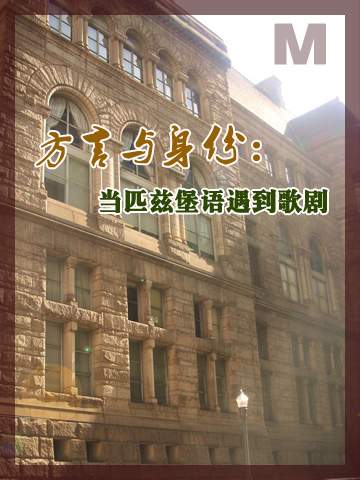十一月一个周日的下午,我在班尼登中心和其他数百名匹兹堡观众一同欣赏莫扎特的《魔笛》。歌剧进行到第二幕,捕鸟人帕帕杰诺刚刚找到了他的真爱。当他开始退出舞台时,我们尚可借助英文字幕理解他的台词。可是接下来,头顶上的字幕跟我们所听到的内容突然不再匹配:帕帕杰诺正告诉我们“钢人队正在城里那片儿打比赛,现在只落后四分!”观众席中顿时爆发出狂笑声。帕帕杰诺刚刚跟我们分享了匹兹堡钢人队的最新得分情况,说的还是匹兹堡语。这是属于匹兹堡的一刻,在一个本来阳春白雪的下午意外出现了下里巴人的一刻,这一刻让我们想起了我们是谁、身在何处。
这样的时刻在这座钢铁之城并不少见。当人们谈论钢人队和海盗队时,说起匹兹堡和匹兹堡人是何样时,想表明自己是匹兹堡人或者想笑话匹兹堡人时,与匹兹堡语有关的表演便会拉开帷幕。这是为何?方言何以成为如此有力的本土认同标志?
On a Sunday afternoon in November I am at the Benedum Center with hundreds of fellow Pittsburghers watching a performance of Mozart’s *The Magic Flute*. It’s the second act, and Papageno the bird-man has just found his true love. The English super-titles help us decipher what he is saying as he starts to exit the stage. But then the English words over our heads stop matching what we’re hearing: Papageno is telling us that the “Stillers are playin’ dahntahn n’at, and they’re only four points down!” The audience bursts into laughter. Papageno has updated us on the score of the Pittsburgh Steelers game, and he’s done it in Pittsburghese. It’s a Pittsburgh moment in an event that could otherwise have been anywhere, a low-culture moment in an otherwise high-culture afternoon, a moment that reminded us of who we were and where we were.
Such moments are common here in the Steel City. People put on performances of Pittsburghese when they talk about the Steelers and the Pirates, when they talk about what Pittsburgh is like and what Pittsburghers are like, when they want to show they are Pittsburghers and when they want to mock Pittsburghers. Why? How has the local dialect become such a powerful symbol of local identity?
方言何以成为有力的身份标识?正是那些导致区域差异消失的因素——经济变更所引起的社会与地域流动——使人们意识到了区域差异的存在并为之庆贺。
- 方言与身份:当匹兹堡语遇到歌剧
- Dialect and identity: Pittsburghese goes to the opera
- 书评 写书评
- 笔记
-
书评加载中...






















 京公网安备 11010802032529号
京公网安备 11010802032529号
笔记加载中...